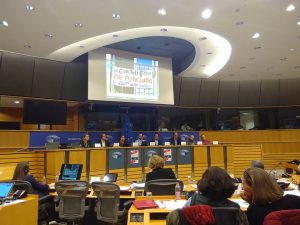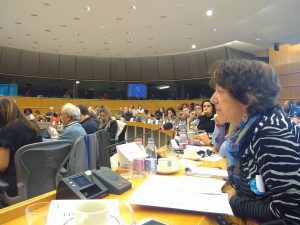The second European Forum of the SSE (EFSSE 2017) took place on November 9, 2017, organised in the premises of the Parliament by the GUE/ NGL Group,for the occasion driven by Marie-Christine Vergiat, French MEP. Following the first session, we can note an increase in the representation of networks of solidarity economy.
RIPESS Europe actively participated in the organization of the second edition, with several invited members, some of which met the day before for a dinner following a coordination Committee.
 Eric Lavillunière in the opening conference recalled the role of the SSE in the project of social transformation and transition towards a more democratic, fair and ecologically viable society. Despite the inherent formalism of the context, the forum offered the opportunity to exchange with many actors, beyond the round tables or workshops that offered limited opportunity for interaction. The comfort of the simultaneous translation allowed everyone to speak in their own language, which gave each one the opportunity to freely share their experience. The themes were all very pertinent to the current burning issues, including the workshop on migrants or the one on the co-construction of public policies.
Eric Lavillunière in the opening conference recalled the role of the SSE in the project of social transformation and transition towards a more democratic, fair and ecologically viable society. Despite the inherent formalism of the context, the forum offered the opportunity to exchange with many actors, beyond the round tables or workshops that offered limited opportunity for interaction. The comfort of the simultaneous translation allowed everyone to speak in their own language, which gave each one the opportunity to freely share their experience. The themes were all very pertinent to the current burning issues, including the workshop on migrants or the one on the co-construction of public policies.
Patrick Klein, representing the European Commission (Head of the social economy team, DG Grow), assured the audience that the ESS represents a credible model of response to major issues of the world, namely the fight against the social and environmental imbalances that threaten all living beings (including forests, seas, biodiversity etc.).
 Josette Combes responded to an opposition between the SSE and “real economy”, by emphasizing the fact that SSE is even more realistic than financialised economy. Recalling furthermore that without domestic work mainly insured by women, the so-called “real” economy would crumble.
Josette Combes responded to an opposition between the SSE and “real economy”, by emphasizing the fact that SSE is even more realistic than financialised economy. Recalling furthermore that without domestic work mainly insured by women, the so-called “real” economy would crumble.
Marie-Christine Vergiat managed to summarize most of the aspects emerged by the debates and put them into perspective for a pitch in defense of the SSE in Europe.
These meetings are especially interesting for the exchanges that can subsequently generate convergences of action and advocacy.
The videos and contributions will soon be the site of www.efsse.org.
[Josette Combes]














